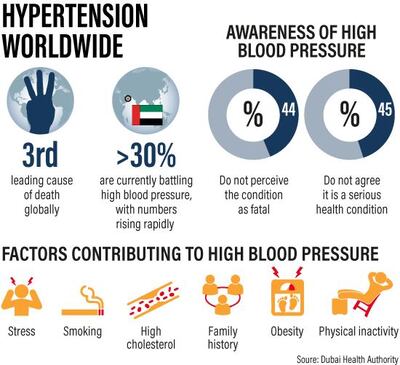Nearly half of UAE residents are unaware of the risks posed by high blood pressure, according to a study that has caused concern among medics.
The survey of more than 1,000 men and women also found one in six said they had never been checked for high blood pressure.
The results of the Heart Your Heart study were released on Tuesday by the American company Cigna Insurance and Dubai Health Authority.
Often labelled the 'silent killer' as most patients show very few symptoms, it is estimated that 30 per cent of UAE residents have high blood pressure, also known as hypertension.
The survey found that 45 per cent believed high blood pressure was not a serious health condition and 44 per cent did not know it could be potentially fatal.
Nearly half - 47 per cent - who did not have the condition were unaware of the symptoms, and that rose to 62 per cent among Emiratis.
The findings also reflected that 16 per cent had never been checked for high blood pressure, rising to 26 per cent among Arab residents.
The study is part of a broader three-year healthy heart initiative to spread awareness nationwide about the need for balanced lifestyles.
About 30 per cent of deaths in Dubai are caused by heart disease and the numbers are rising, DHA figures show.

“Hypertension is usually discovered accidentally - often it’s a chance diagnosis", said Dr Mohamed Farghaly, a specialist in family medicine at the health authority.
"Although it's easy enough to detect, once diagnosed it is a life-long treatment.
"This is a good chance to promote awareness because the incidence increases with age and the numbers are on the rise in our region.
"Cigna’s initiative supports our mission to raise awareness about healthier lifestyles.
"Even though people over 40 are said to be more prone to high blood pressure, the message we want to send out is that early detection is essential as early as 18 years.”
High stress, family history, weight and a sedentary lifestyle are triggers for high blood pressure.
The survey also found that only half of residents go for a full health check-up once per year.
Although not every insurance plan covers full-body health check-ups, even the basic mandatory insurance covers blood pressure tests and a range of other treatments.
Cigna said the results are part of generating a nationwide conversation about heart health and heart disease.
“It’s a call for action,” said Jason Sadler, president of Cigna International Markets.
“A World Health Organisation study tells us that some 50 per cent of women with cardiovascular disease in the region will die before the age of 60 - that is both frightening and alarming.
"Therefore our goal is to champion healthy hearts across the UAE. A critical part of our plan is to reach all residents with the message that proactive screening to identify the disease is the first critical step.”
Information would be promoted about eating healthy, lifestyle changes including regular exercise and adequate sleep.
_______________
Read more:
UAE National Service recruits screened for heart conditions in drive to save lives
Heart disease is UAE's biggest killer, but women don’t know the warning signs
Wealthy UAE residents 'significantly more at risk' of heart disease
_______________
“Nearly 69 per cent of people who have their first heart attack are found to have a history of high blood pressure. Doctors must work continuously with their patients to ensure they are aware of ways to control the condition from becoming life threatening,” said Dr Omar Hallak, a cardiologist at the American Hospital in Dubai.
“It’s important to have this head start to prevent a heart attack instead of the effort spent to handle a patient after. A patient needs to take care of himself because of the long term impact. If a person has a healthy lifestyle, he will require less medication.”
Other harmful consequences of untreated hypertension are damage to the kidneys and eyes, bone loss and trouble sleeping.
Although a chronic condition that causes gradual harm over the years, it can rise quickly and create an emergency situation requiring hospitalisation due to severe damage to the main artery, stroke, chest pain, heart attack, restricted pumping of the heart causing fluid backup in the lungs and sudden loss of kidney function.
Mobile screening clinics will be a feature of the Cigna’s monthly park running events starting at Zabeel Park on October 6.





